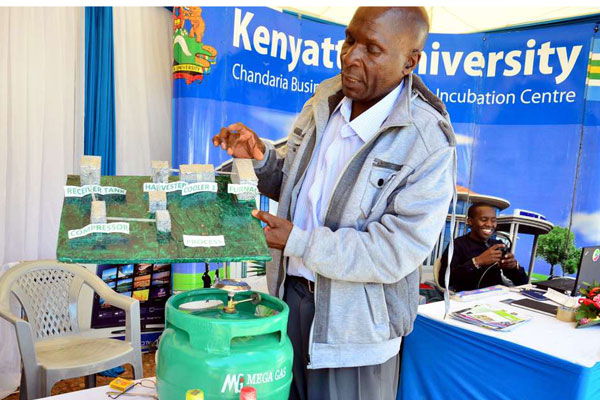At sixty one years, James Isedia Mulema should be enjoying his retirement from his 30 year teaching profession; instead he is now earning 10 times his salary from recycling plastic waste into clean gas fuel for domestic use.
Mulema, who was a science teacher at four different public primary schools in Western Kenya during his tenure, was driven by the desire for a clean environment and healthy society to start his company, Mega Gas Enterprises.
The World Health Organisation estimates that 14,300 people die annually from health conditions arising from indoor air pollution in Kenya.
In agriculture, plastics prevent the soil from breathing and obstruct flow of minerals and nutrients required by crops.
Together with two former colleagues; Evans Mutuva and Simon Isohi, they founded Mega Gas enterprises in 2015 with an investment of five million shillings from their savings and now earn approximately Sh300,000 in profits monthly.
Related
Biogas chiller extends milk shelf-life for 14 hours
Biogas heater reduces chicks brooding energy cost to zero
Row as Kenyan claims his famous biogas invention was stolen by German

James Mulema explains how Mega gas works. Courtesy
“I started my research into various ways of decomposing plastic waste six years ago by setting up my own laboratory at home. In 2014, I designed a diesel powered reactor which converts gaseous fuel through a very clean process which I harvested into a cylinder using high pressure,” said Mulema.
“I then forwarded the tests to the Kenya Industrial Research and Development Institute.
The officers there helped me narrow down to one method of producing gas that we achieved through my design of a fractional chamber that allows for filtering of smoke and solid substances leaving a clean gaseous fuel. They charged me Sh20,000.”
Mega Gas which is located in Vihiga County sources raw materials which include broken plastic chairs, cement bags and polythene bags from Kisumu’s Kachok dumping site, which Mulema says cannot be exhausted due to the non-decomposition element.
“Plastics are made using active gases and these gases do not expire when the plastics are worn out and are discarded,” said Mulema.
Once plastic waste is loaded into the reactor it is switched on to attain a temperature of about 750 degrees Celsius which enables easy decomposition of the plastic waste. The gases produced are passed through a filter where solid substances are sieved and the gas compressed and dried. The equipment also filters all particulates from smoke to maintain a clean environment.
Mega Gas refills at least 200 six kilogram cylinders per day from two metric tons of plastic waste with a full package six kilogram cylinder retailing at Sh3,550. Refilling an empty six kilogram cylinder costs Sh350, which is 41 per cent cheaper compared to the current retailing prices of the commodity across various outlets.
The cost of production is Sh90 for every six kilogram cylinder, in this, the factory rakes in Sh260 in profit for each refill.
“Innovation is about cutting on the cost of living hence our gas prices remains at about half price that of liquefied petroleum gas,” said Mulema.
He sells the gas directly to consumers within Vihiga but plans to establish a plant in Nairobi in the next two to three years.
To understand the running of a business, Mulema had his first training at Kenyatta University's Chandaria Business Innovation Center in 2014. In 2017, he was mentored at IbizAfrica, an organization that seeks to provide a nurturing environment for business that work for the common good in society and the Kenya Climate Innovation Center (KenyaCIC), an organization that supports locally relevant climate and clean energy technologies.
His company received support in terms of technical expertise, business skills and mentorship programs.
However like any other businesses, he has faced various challenges with the main one being how to raise capital to expand the business.
“The high cost of setting up a plant was our main challenge, although we raised funds from friends and savings, I opted to increase our range of products to include use of water hyacinth to manufacture fire and water proof high quality ceiling boards which cost lower than those on the market today in Kenya,” said Mulema.
Mega Gas has seven permanent skilled workers at the factory which regularly employs 10 to 20 casuals in a day to collect raw materials. For the future, Mulema intends to hire distributors, marketers and retailers as the company targets expansion into two more counties in western Kenya.
The company targets to increase their production processing capacity from the current 1.75 tons a day to 10 metric tons of plastic waste in the next four years.